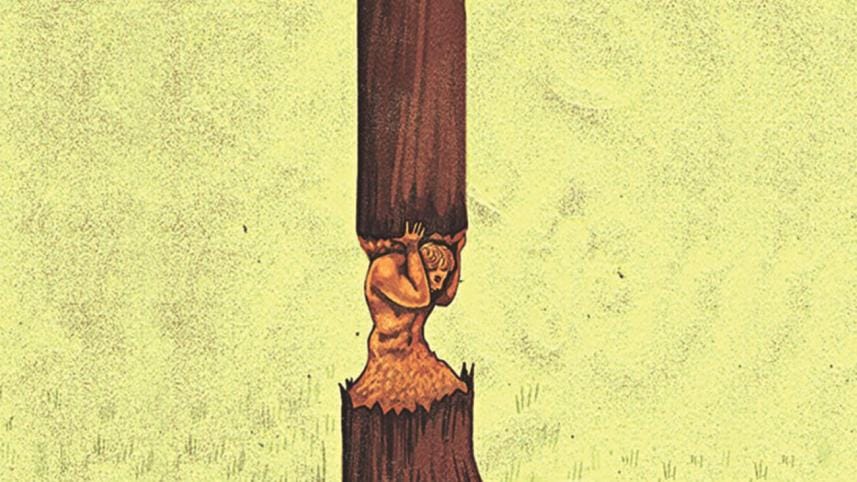Inequality and our mistaken modernity

We derive our swagger from the pervasive inequality in our society. There is inequality even among the pets we keep. There are mainly two kinds of dogs in this country. White and black dogs that live in the luxury of homes, and brown dogs that live on the street and vie with other street dogs for food and shelter. The lines are drawn clearly.
Dogs that live in homes have European or North American pedigree. They are the Alsatians, the German Shepherds, the Labradors and so on. We seldom speak to them in Bangla. It's always "come here," "sit down," "good boy/girl." Give us a canine and we break into English.
Why can't we keep local brown dogs that are available everywhere? With nutrition and care, surely they can look better and learn a few tricks. Is it because through dogs we seek identification with the west? And while we are at it, what's up with the bizarre accent with which a lot of youths speak Bangla? Are these ways of satisfying our deepest desire to separate ourselves from the rest of Bangladesh? Is this our idea of being modern?
These practices remind me of Jalal-e-Ahmed, an Iranian thinker who coined the term "westoxication" as opposed to "westernisation" in the context of Iranian Revolution led by Ayatollah Khomeini. With due apologies, let us term these trends as "modernoxity" as opposed to "modernity". But what is modernity and what are the characteristics of a modern society? Is it a mere intoxication with the consumerist display of the latest commodities and gadgets?
In his book Mistaken Modernity, internationally acclaimed sociologist and former Jawaharlal Nehru University professor Dipankar Gupta defines modernity as "characterised by an attitude of equality with, and respect for, others. It is not as if in a modern society all are actually equal. Yet, in spite of the many differences that exist among people, modernity demands a baseline similarity so that people can live with dignity and can realistically avail of opportunities to better their conditions of existence. It is on this bedrock of equality that other differences and inequalities can be added on. But the foundational equality cannot be compromised for it is on this that claims of citizenship are made in modern societies. In traditional orders, there were rulers and subjects but no citizens."
Of course, professor Gupta made his observations based on the hypocrisy and vanity of the caste-based Indian society and its pitiful attempts to cloak its traditional ways in phony modernity. If in a society the rights of citizens are constantly desecrated, women and minorities are rendered second-class citizens by the state, and rule of law takes a back seat to muscle and money, then that society is not modern. It is difficult to be impressed by economic indicators when citizens are murdered for what they eat.
The "baseline similarity" Gupta was talking about is evident in most civilised societies. Somebody who works at a minimum wage in North America can easily afford the basic amenities of life including an economy car. If someone is a victim of a crime, they can trust institutions to deliver justice. What quality of life can a garment worker or a domestic worker in this country expect with his or her monthly salary?
It is true that the poverty level has plunged. It is one of our greatest achievements since independence. The idea that people should be able to live a decent life after putting all the hard work that they do is a cardinal tenet of a healthy and modern society. There is ample evidence that it has not held true for quite a while. Why do slums exist in this megacity? Who are the people that live there? Are they all criminals and drug addicts? Or, are they mostly people who break their bones from morning to night to provide us with services that we believe make us superior to them?
This is the modern Bangladeshi paradox. Those considered "modern" in terms of sporting luxury cars and branded clothes simultaneously perpetuate medieval prejudices based on social hierarchy. Bangladesh's march towards modernity is thus being thwarted not merely by the inflexibility of age-old institutions and norms, but by the values of neo-liberal consumerism that preaches treating women as objects, etc.
Our Constitution lays down the edifice of a modern democracy based on equality and justice for all. Has the collective consciousness of the people risen to this level? Harold Laski said that the state determines what kind of citizens it wants to develop. Nothing we have seen or heard so far in the election rhetoric of the political parties assures us that they are committed to building a modern democracy based on rule of law where everyone is equal.
Amitava Kar is a member of the editorial team at The Daily Star.




Comments